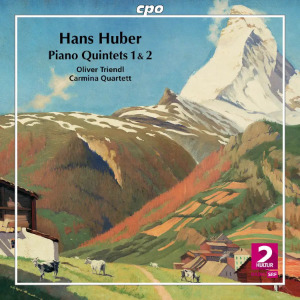
Hans Huber (1852-1921)
Piano Quintet No 1 in G minor, Op.111 (1901)
Piano Quintet No 2 in G major, Op.125 (1908)
Oliver Triendl (piano)
Carmina Quartett
rec. 2022, Radio Studio SRF, Zurich, Switzerland
cpo 555 569-2 [61]
Hans Huber’s piano quintets were written in the first decade of the new century and offer very differing viewpoints. The earlier, in G minor, Op.111 was premièred in November 1901 and strikes a strongly contrapuntal posture. Its fugal pretensions are evident from the start though Huber is careful to add some flavoursome drama and alternating playful material in his unusually compact opening movement. Thereafter things generate rather Brahmsian influence – recollections of the older composer’s Op.34 are never far away – but what intrigues how stuffed full of material is this work – flowing material, sweeping melodies, dense ensemble writing feels rather fast here but Huber is never short of a con fuoco and the finale ends urgently and dramatically. It’s all somewhat unremitting and the acoustic emphasises a certain shrillness to the strings – the studio acoustic is good but not perfect for the ensemble.
The second quintet is subtitled a Divertimento and Huber reveals a much lighter, graceful and lyric face to the world. Here fugal writing is dropped and fantasia-like, rhapsodic music predominates. He explicitly employs Swiss folk melodies, not least in the large-scale opening movement though they are finely integrated into the writing and not employed as decorative potpourri/ the Theme and Variation second movement is well characterised and finely varied in density and colour – there’s one especially fizzing variation that teems with ardour. There’s a deft sliver of an Intermezzo –it’s barely two minutes long but even so it amused the original audience at its premiere who were amused by its witty pay-off. Huber reserves the most heavy-booted elements for his finale through which a songful melody floats wistfully and delicately.
The two quintets reflect Huber’s divergent approaches to the dictates of the medium – strictness of sonata form in the G minor, more prolix freedoms in the companion work. If you find the earlier work too clotted and in thrall to conventional models you will find the later quintet more to your tastes, should they run to fanciful rhapsodic folkloric elements. Hard-working Oliver Triendl and the Carmina Quartett play with admirable generosity throughout.
Jonathan Woolf
Buying this recording via a link below generates revenue for MWI, which helps the site remain free




















